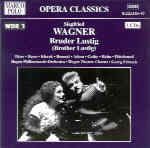It is inevitable that the son of one of the most influential composers of his (or any) era would be compared to his famous father. The question is: do we listen to the music of Siegfried Wagner hoping to find the deep influence of his father, or, when he strays from that formidable example, do we enjoy his rebellion and take him on his own artistic terms? Sadly, in this case, no matter which way you listen, the hard musical evidence shows neither the stamp of originality nor the work of a skilled and clever imitator. The music to Bruder Lustig, a wheezy, overlong grand opera, might be compared to papa Richard’s Rienzi, an early effort and not his strongest work. But while we hear Rienzi as a shape-of-things-to-come work, an early offering from a brilliant composer struggling to find his voice, Bruder Lustig is allegedly the creation of a fully formed artist. Although the son is not trying to be like the father, in fact we find shades of Wagner senior throughout the work: halfway through Act 1, Scene 3, an unresolved “Tristan” chord makes an unwelcome (unintentional?) appearance.
The cited debt is to Nicolai, Siegfried’s not-so-secret hero, but the true nod ought to go to Meyerbeer, Richard Wagner’s musical arch-enemy. This is an opera that, according to the composer himself, is “…neither comic nor serious–but both together.” There is bombast and pomp, and at its more interesting points the score is riddled with shameless waltzes, hunting calls, and drinking songs. Beyond that, the score just sounds like page after page of filler, Meyerbeer at his most mediocre.
Siegfried spent a good deal of his life in service to his father as both a stage director and conductor, but as a composer he was clearly at odds with a serious ghost, and this did him harm. The question is: if your father was Wagner and you wanted to rebel, why not become a symphonist? In an era where such composers as Richard Strauss, Franz Schrecker, and Alexander Zemlinsky were coming to terms with the overwhelming influence of Wagner the elder, his own son was lost in the fray. This work becomes more of a psychological profile than a proper composition (and ought to be taken as such)–a textbook case of the anxiety of influence.
The plot, which takes place in the Middle Ages, centers around a local boy named Heinrich who is in hot water with the court. He struck and killed a court official when he saw him maltreating a child, and then threatened to cut off Emperor Otto’s beard if he were not released. Heinrich returns to the scene of the crime in women’s clothes, and Walburg, his childhood friend who helps him into his drag, falls in love with him. From there the overly complex plot involves sorcery, witches, a wedding, the return of the wronged emperor, and ultimately peace; to go into greater detail here would take pages.
This recording, which for starters lacks an English translation of the libretto, is a flawed account, mostly due to distant and imbalanced sonics. Sometimes it’s hard to tell if the performance, which was recorded live, is actually any good. As the titular Bruder, Volker Thies is quite good, carrying the three-hour-long show with personality and a truly remarkable voice. Others rise to the occasion, especially Dagmar Hesse as Walburg, though her heavy voice is only vaguely convincing in the role. It is hard to say much about the quality of the orchestra, due to the poor quality of the engineering, but the players do seem to hold everything together and show remarkable stamina, informing the score with as much seriousness as possible under the circumstances.
































